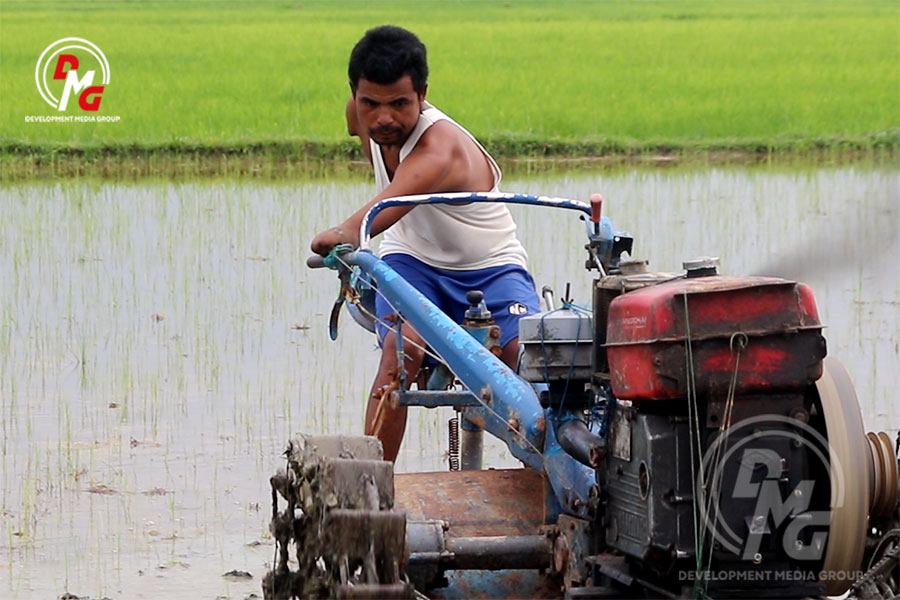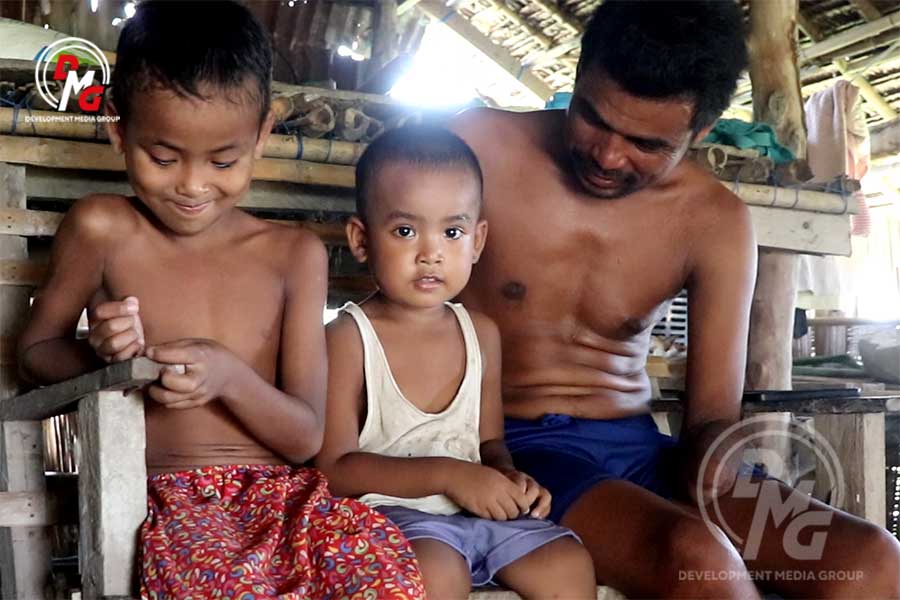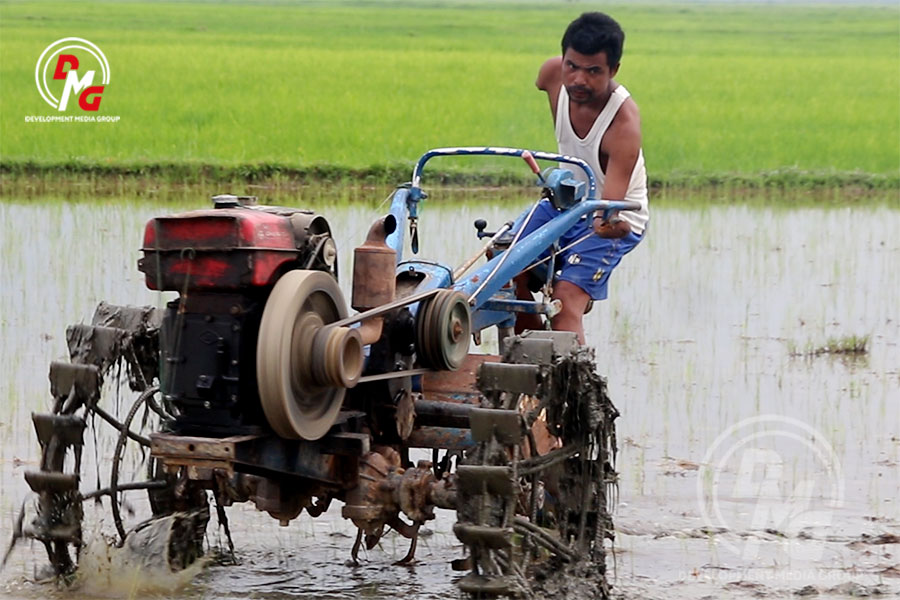- The Mizoram Hard Journey (or) Sailing Up the Kaladan
- Arakan Army expands operations into Sagaing Region, seizes four junta camps
- ULA purchases paddy from farmers amid market shortage in Arakan State
- After Arakan fighting, Taungup residents struggle to rebuild homes
- Charcoal sales surge in northern Arakan after AA firewood ban
‘I Don’t Have Arms, But I Can Run a Farm’
“I was in despair after I lost my arms. I ate poison to kill myself. Doctors and nurses stopped me from killing myself several times. So, I could not commit suicide,” said Ko Aung Myat Tun.
27 Nov 2023

Written by Mrat Swe
“I don’t have arms, but I can run a farm,” said Ko Aung Myat Tun. The man, in his 40s, used a tractor to plough his farm. He struggled as he had to use force from other parts of his body to operate the large tractor.
“I can operate a tractor,” he said with pride. Born in Tin Nyo village in Arakan State’s Mrauk-U Township, he is the youngest of three sons. He was not born disabled. As jobs were scarce in his village, he went to Thailand together with his friend to work on a fishing trawler.
He was only 20 then. Just one month after he arrived in Thailand, he had the misfortune to cover for a friend who deployed fishing lines.
“I had been in Thailand for only a little more than one month when the accident happened. My right hand got into the electric reel, and as I tried to shut it down, I lost both arms,” said Ko Aung Myat Tun.
A colleague came to his rescue and cut the fishing line. Thanks to his colleagues, he could receive medical treatment immediately at a hospital.
At first, he could not accept his new reality, and attempted several times to kill himself.
“I was in despair after I lost my arms. I ate poison to kill myself. Doctors and nurses stopped me from killing myself several times. So, I could not commit suicide,” said Ko Aung Myat Tun.
After spending one month and a half at the hospital, he became acquainted with a man who had met a similar fate as him, which finally changed his life, he said.
“I met a man at the hospital whose condition was worse than mine. He has complete body parts, but his nerves were severed in a knife attack. He can’t move. Two of us become one. Thanks to him, I decided to move on,” he said.
After receiving treatment in Thailand, he returned to his native village in Arakan State. While some encouraged him, some spoke ill of his disability. He managed to overcome it by practising Buddhism.
“I realised that it is karma. I believe I lost my arms because I did something bad in my previous lives. I have to repay this life. If I kill myself in this life while I have not yet repaid, I will have to repay in my next existence. So, I decided to live the rest of my life happily,” Ko Aung Myat Tun explained of how he managed to accept his new reality.

Ko Aung Myat Tun later married a woman from his village. He now has three sons. He works hard for the future of his sons.
Operating a tractor without arms is tough, and requires extreme caution, he said.
Ko Aung Myat Tun not only cultivates his own farm, but also cultivates the fields owned by villagers in the village on lease. Currently, about 10 acres of land has been cultivated with his tractor. Ko Aung Myat Tun said that before he had a tractor, he used to plough the fields with cows without hands.
“If someone had started my tractor while plowing, I would have got it. I alone can control the tractor and plow the field. If I have someone to start the tractor, I can plough the field all day,” said Ko Aung Myat Tun, wiping the sweat from his brow.
After ploughing the field, Ko Aung Myat Tun had to use his legs instead of his hands to grow paddy plants. Cultivating paddy plants with feet is laborious and tiring, so there are times when his wife helps him to plant.
If farming is the main income of Ko Aung Myat Tun’s family, it cannot be mistaken. However, farming can only be done once a year, so Ko Aung Myat Tun could not be satisfied with this business alone. Ko Aung Myat Tun borrowed a lot of money from people in the village to get another income for his home, and he currently owns a poultry farm with a capacity of 500 chickens.
Ko Aung Myat Tun and his wife are the only husband and wife to raise chickens, and his wife Ma Htay Htay Soe has to help with the parts that Aung Myat Tun can’t do.
“When raising chickens, the only thing I had to help him with was heavy lifting. He does all the rest. When working in the field, I helped him plant paddy plants because he can’t plant paddy plants with his feet for many hours,” said Ma Htay Htay Soe.
Ma Htay Htay Soe said that sometimes when Ko Aung Myat Tun had to go to buy feedstuff for the chickens, he would drive the boat in the creek by himself and go to Tin Nyo Bazaar to buy it. Ko Aung Myat Tun was able to expand from one chicken farm to three by collecting the profits he got due to his tireless hard work.
Ko Aung Myat Tun’s poultry farm was destroyed by Cyclone Mocha, which made landfall in Arakan State on May 14.
“Cyclone Mocha destroyed all my poultry farms, killing hundreds of chickens,” said Ko Aung Myat Tun.
Ko Aung Myat Tun said that because all the money borrowed to raise chickens in the two newly built chicken farms had to be used to repair the damaged chicken farms, it is currently difficult to raise chickens.
“Of the three chicken farms, one farm was completely destroyed, and the other two farms only had chickens in one farm. Because the chicken farms were rebuilt, I didn’t have any money to raise chickens in the next farm,” said Ko Aung Myat Tun.

Ko Aung Myat Tun’s elder sister, Daw Aye Yin Kyawt, was saddened that her youngest brother had become disabled, and said he was a hard worker, above and beyond the average person.
“My brother is disabled, but he doesn’t feel depressed at all and is thinking about working. He works very hard. Even in the rainy season, he plows the field even though his limbs are not perfect. If I see him working like that, I, as a sister, feel very sorry for him,” she said.
Ko Aung Myat Tun did not finish school due to the difficulties of his parents when he was young, but he also said that he does not want his children to be like him. Therefore, Ko Aung Myat Tun said he is currently working for the future of his children and wants to return to work.
“I also want to raise chickens on another chicken farm. I would like it if a livestock related organisation would issue money with a guarantee and a low interest rate. I can repay the loan. I also understand profit,” said Ko Aung Myat Tun, a man clearly undeterred by extraordinary adversity.






.jpg)













